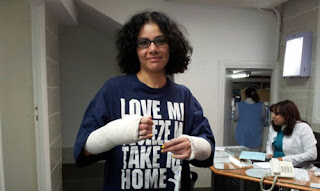
After five days of fighting, the major clashes around Tahrir Square ended on Thursday (well, until this happened a couple of hours ago). The army built a six-meter concrete wall on Mohammed Mahmoud street, where most of the fighting had taken place. Some civilians—probably organized by the Muslim Brotherhood—dragged and beat the youth who've been permanently fighting there for the last week out of the road and linked arms, four rows deep, at the entrance to it. So began a week in which Tahrir has been defined by its internal antagonisms as much as its conflict with the authorities.

The square has become a weird space. The police aren't fighting to retake it, so the people aren't fighting to hold it. Instead, they gather in huddles, chanting or talking politics, while vendors hawk barbecued corn, tea, and giant pink clouds of candyfloss. In fact, most of the violence in the square since November 19—when police killed a protester at a sit-in at the nearby parliament building—has involved these vendors, who have fought turf wars with each other, with local shop-keepers, and with the square's security volunteers. They've brought out bats, petrol bombs, and at least one pistol.

But for the moment, instead of a battleground, Tahrir is a monument. Even a general from the ruling council called the occupiers "honorable" while condemning those fighting nearby, even though they're largely the same people. Banners showing the dead and wounded are strung across the square, and the tourists are beginning to show up.


The Muslim Brotherhood held an emergency meeting with the head of the Supreme Council of the Armed Forces (SCAF), the interim military government that has held power since July. They agreed to a plan which sees SCAF retain power with the support of a former Mubarak-era prime minister named Kamal Ganzouri, who provides a civilian gloss to a military government. (SCAF Field Marshall Hussein Tantawi is still very much the big dog.) Together with the wall, the impending elections, and the promise that Egypt would have an elected president by July, this has been enough to defuse most of the violence. It's a far cry, however, from the slogan which continues to ring across the square, day and night: “The people want the downfall of the field marshal!” In shutting down the street they claimed as their own in January, the Muslim Brotherhood have become the uneasy allies of the military.

Nazly Hussein, a media activist, had an encounter with this alliance as she tried to return to Tahrir from Mohammed Mahmoud street on Thursday. She was stopped by a line of men who wouldn't let her pass, including members of the Brotherhood. In the ensuing argument, a man hit her friend Salma.
“When she was slapped all hell broke loose and we were beaten up in the street," Salma told me. "I was shot in the knee the Monday before with a rubber bullet. While I was being beaten, some old guy was like 'Slowly, she's hurt in the knee, she's injured,' but the guy who was beating me looked at my knee and started kicking me right there.”

Nazly walks with a crutch now. There were numerous reports of activists being attacked that day and the next—I saw three women assaulted and chased myself—but the violence subsided thereafter. Nazly believes that the campaign of harassment was orchestrated by the secret police in order to discredit and disrupt the unity of Tahrir. The men who attacked her disappeared soon after.
“I've been on the square on days when it was not that comfortable for women to be there. But I've never had the urge to leave the square because it was so uncomfortable. That day was different. It was extremely systematic. It was extremely well organised. And the Brotherhood guys didn't join in, but they watched and did nothing.”

The belief that the secret police are responsible for much of the tension in the square is widespread amongst activists here. If this sounds like a conspiracy theory, consider that in a police state—which Egypt has been for decades—the state really is run as a giant, official, rubber-stamped conspiracy. The secret police really are ubiquitous, and the atmosphere of paranoia it generates is palpable.

Meanwhile, pro-government demonstrators at a rally in Abbasiya last week took conspiracy theory to a different level. They believe that the Tahrir protests are inspired by Israel, the Freemasons, and maybe even the Illuminati. I was ejected from a protest in Alexandria myself on the basis that I might be an Israeli spy.


Egypt's first post-Mubarak elections have begun and will almost certainly return huge support for the Muslim Brotherhood. They are insanely well organized, with several activists outside every single polling station, cheerfully flouting the laws against campaigning on election day.

Election campaigning on polling day: banned, but ubiquitous
But there are three powers in Egypt: The army in its barracks, the Brotherhood at the ballot box, and the revolution on the streets around Tahrir. The elections might bring the former two into alignment, but not the last—at least in the long run. As Khalid Abdalla, an actor, puts it: “Elections have an ability to defuse a tension that's existing right now. People feel like they've done something that represents them.”
For now, maybe they do. How long that feeling will last is another question entirely.

ٍSource : vice







































.JPG)
